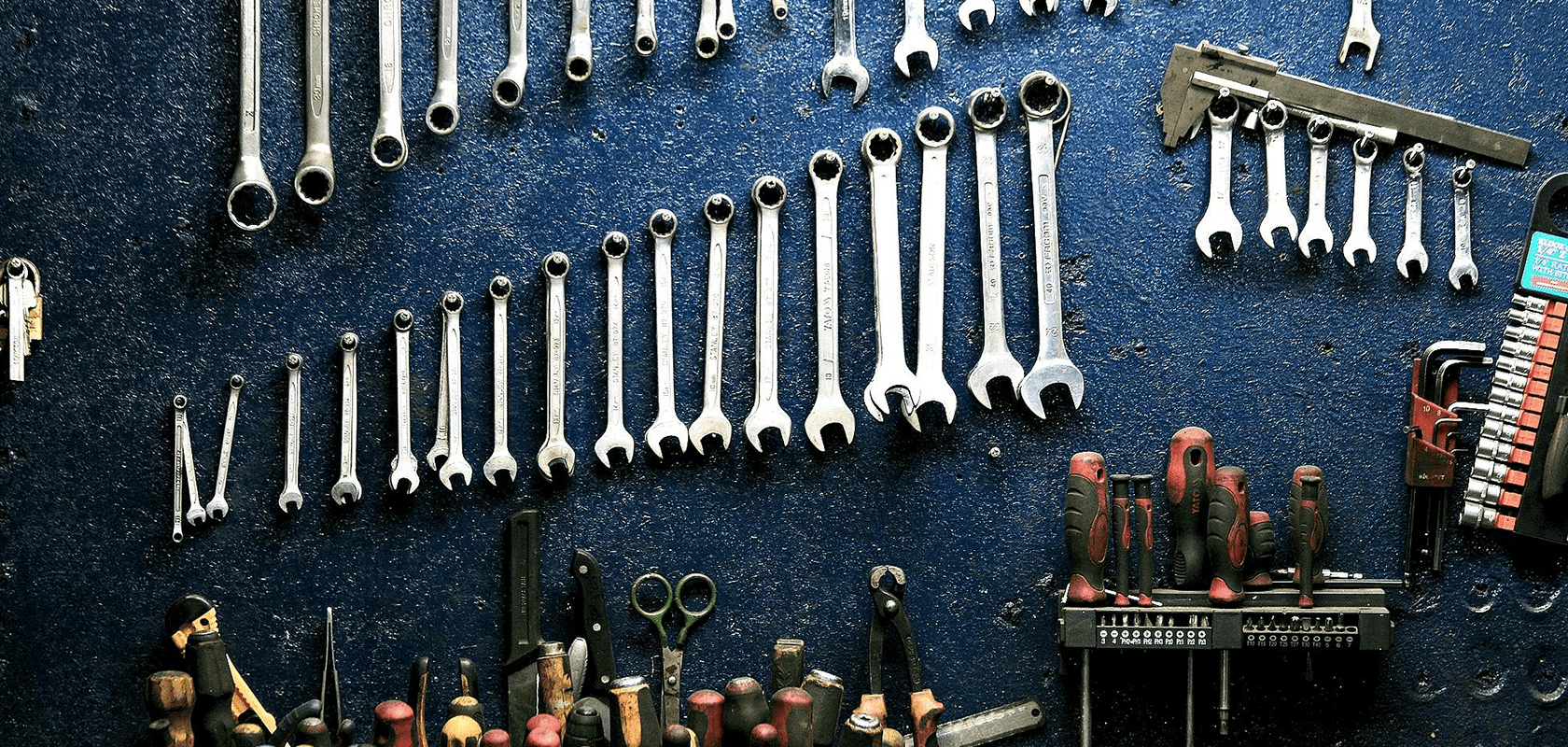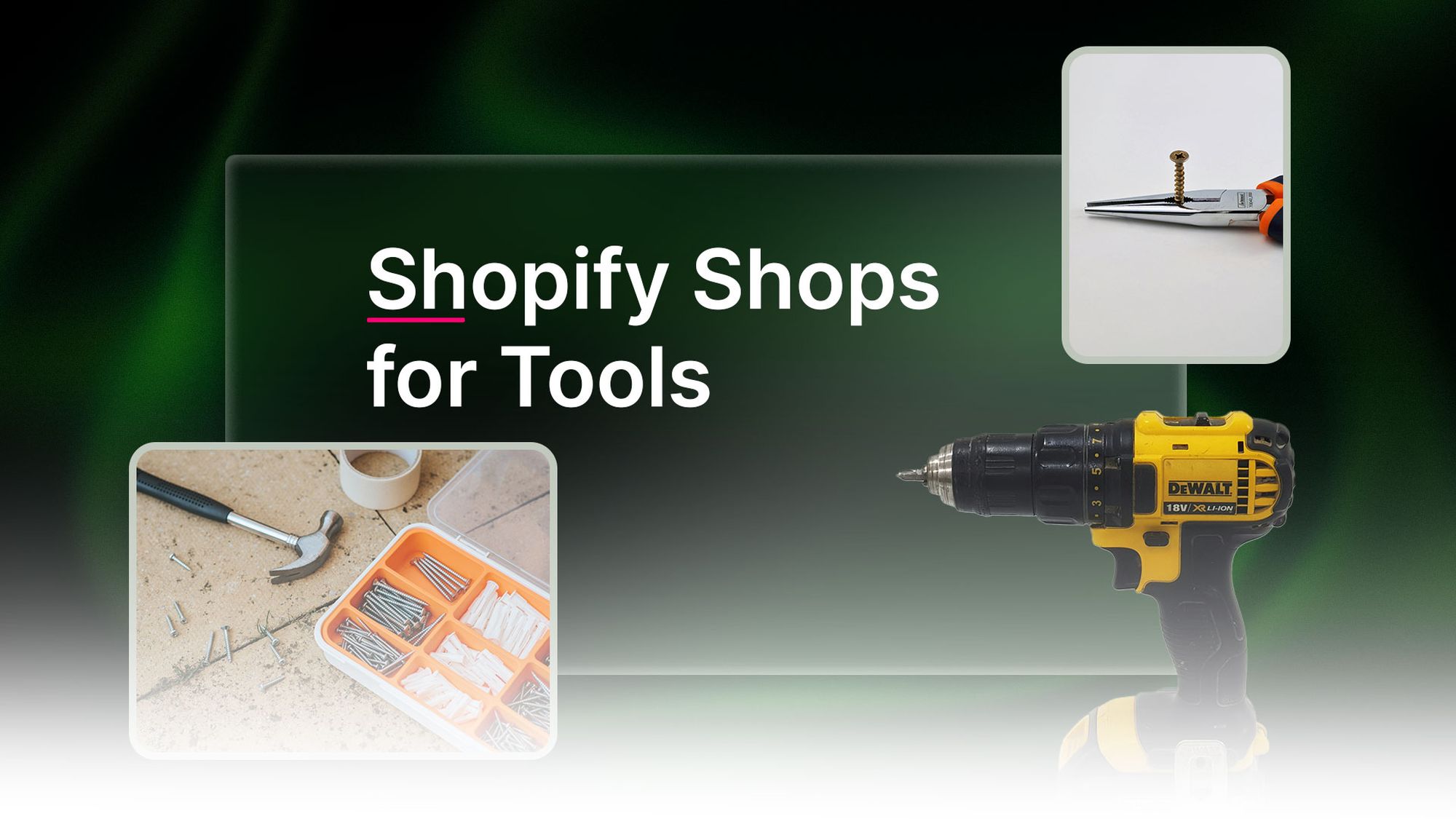Whether you're a professional craftsman or a DIY enthusiast, the demand for high-quality tools remains strong, and more and more people are buying their products online. From classic hand tools and power tools to specialised machines and accessories, the tool market offers enormous potential in e-commerce.
With a professionally designed Shopify store for tools, retailers can increase their reach, target their audience, and benefit from the growing trend toward online shopping.
In this article, you'll learn which types of tool products are particularly suitable for online retail, which Shopify features are crucial for selling tools, and what advantages e-commerce retailers have in this segment.
Table of contents
We would be happy to help you set up your tool shop! Simply get in touch with us and we will discuss your project.
Which tool products can be sold online?

The range of products available in tool shops is diverse, from inexpensive screwdrivers to professional workshop equipment. The following items are particularly popular in online retail:
Hand tools: screwdrivers, pliers, hammers, saws
Power tools: drills, cordless screwdrivers, grinders, jigsaws
Machines & equipment: high-pressure cleaners, welding equipment, compressors
Measuring and testing devices: laser rangefinders, spirit levels, multimeters
Workshop supplies & accessories: screws, bits, sandpaper, spare parts
Sets and bundles: complete sets for DIY enthusiasts, starter kits for professionals
Thanks to this wide range, shops can tailor their product range to specific target groups – from hobby DIYers and professional craftsmen to specialized industries such as electrical, construction, and automotive.
Hint: Focus on structured product categories, detailed product descriptions, and high-quality product images. In the tool sector in particular, it is crucial to present technical data clearly.
Which target groups buy tools online?
In addition to the variety of products on offer, it is also worth taking a look at the different customer groups:
DIY enthusiasts (B2C): They often look for complete sets, starter kits, or simple instructions to carry out projects themselves.
Professional craftsmen (B2B): For them, reliability, availability in larger quantities, and transparent pricing structures are important.
Industry & special sectors: Companies in the construction, automotive, or electrical industries often need large quantities of special tools and spare parts.
For retailers, this means that with clear segmentation (e.g., different categories, price lists, or bundles), Shopify stores can tailor their offerings precisely to these target groups.
Reading tip: Customer segmentation is essential in e-commerce. We explain how you can better understand your customers.
What are the advantages of selling tools via e-commerce?
Online tool sales offer retailers and manufacturers numerous strategic and economic advantages:
Broader reach: Online shops make it possible to reach customers far beyond the regional area—from DIY enthusiasts in the neighboring town to craft businesses in another city or even another country.
Higher margins through direct sales: Manufacturers can sell tools directly to end customers without intermediaries. This reduces costs and increases profit margins.
Targeted approach to different target groups: Segmentation and personalized offers allow both private and business customers (B2B) to be served efficiently – including individual price lists, bulk orders, and special promotions.
Recurring revenue through consumables: Many tools require regular accessories or replacement parts, such as drill bits, sandpaper, or batteries. Recurring purchases can be promoted through subscription models, bundles, or targeted cross-selling strategies.
Strong product presentation and content marketing: Tools can be presented in detail online: instructions, tutorials, application videos, or high-quality images increase trust and facilitate the purchase decision.
Customer reviews build trust: Reviews, testimonials, and photos from users increase credibility, reduce returns, and boost conversion rates.
Data-driven optimization: Online stores provide valuable information about sales figures, popular products, and purchasing behavior. This enables retailers to continuously optimize their product ranges, marketing, and inventory management.
Flexibility and scalability: E-commerce makes it possible to flexibly adapt product ranges and sales channels—whether for seasonal promotions, new product lines, or international expansion.
Design & usability: How to make your tool shop stand out
A tool shop thrives on clarity and a clear structure. Good user guidance is crucial, especially for large catalogs:
Navigation & filters: Customers need to find what they are looking for quickly, e.g., by filtering by application (wood, metal, etc.), manufacturer, price range, or tool type. Shopify apps such as Boost Product Filter & Search help to organize even large product ranges in a user-friendly way.
Mobile optimization: The majority of DIY purchases now start on smartphones. A mobile-friendly theme (e.g., Dawn or Impulse) ensures that even complex product catalogs are easy to use.
Conversion optimization: Trust elements such as seals of approval, fast loading times, and clear calls to action increase the conversion rate.
Example: A shop that sells drills should also show customers suitable filters such as drilling power and price range. This allows both DIY enthusiasts and professionals to quickly find the right model. It should also show suitable drill bits for different surfaces (wood, metal) as upselling items.
Reading tip: Read all about good UI/UX design with Shopify and what you should pay attention to here.
Selling tools with Shopify: These are the features offered by the platform

Shopify offers all the features merchants need to sell tool products and can be flexibly adapted to the requirements of the industry.
Product variants & bundles
Many tools are available in different sizes, power levels, or designs—whether it's a 12V, 18V, or 36V cordless screwdriver, a set of 5 or 10 screwdrivers, or a spirit level in lengths of 30 cm, 60 cm, and 120 cm. With Shopify, these product variants can be stored directly in the product editor. This allows an item to be clearly displayed on a product page instead of having to create a separate item for each variant. This makes it easier for customers to choose and improves the overview in the shop.
Shopify also offers the option of selling bundles and sets. This is particularly attractive in the tool sector: retailers can offer a complete set with a drill, battery, charger, and case as a package, or bundle consumables such as drill bits and sandpaper in larger quantities. This not only increases the average basket value, but also makes it easier for customers to make a purchase decision because they receive everything they need in one package.
Shopify's standard features are often sufficient for simple sets. If you want to offer more complex bundles or flexible sets, you can use Shopify apps such as Shopify Bundles or Bundle Builder. These allow you to create individually configurable tool sets, for example, where customers can select their preferred sizes or accessories themselves.
Reading tip: Read everything you need to know about Shopify Bundles and which retailers are using them successfully here.
B2B features
Business customers (B2B) make up a large part of the target group, especially in the tool sector: craft businesses, construction companies, and industrial customers regularly purchase in larger quantities and expect different features than private end customers. Shopify Plus offers a range of special B2B features that are tailored precisely to these requirements. A key example is the net price display. While private customers see gross prices including VAT, business customers expect a clear net display. Shopify Plus makes it possible to automatically adjust this display depending on the customer group.
In addition, individual price lists and discounts can be stored for specific customers or customer groups. A craft business that purchases regularly can thus obtain better conditions than a one-time buyer. This strengthens customer loyalty and makes it more attractive for companies to buy directly from the retailer.
The issue of large orders is also crucial in the tool trade. Business customers often order entire sets, boxes, or pallets. Shopify Plus offers features to simplify these processes—such as quick order forms, bulk pricing, or the ability to select products directly in large quantities.
Reading tip: You can find a detailed guide to B2B with Shopify here.
Cross-selling & accessory recommendations
Accessories and supplementary items play a central role in the tool trade: hardly anyone buys a drill without sooner or later needing drill bits, bits, or a replacement battery. This is exactly where cross-selling and upselling come in—strategies that allow you to recommend suitable additional products to customers and thus increase the value of their shopping cart.
Shopify already offers basic options for displaying similar products. However, with specialized apps such as ReConvert Upsell & Cross-Sell, these recommendations can be made much more targeted and personalized. For example, a customer who adds a drill to their shopping cart can automatically be shown matching accessories such as drill bit sets, a sturdy toolbox system, or safety accessories.
Customer reviews & trust
Quality is the top priority in the tool market: customers want to be sure that tools are durable, precise, and reliable—regardless of whether they are purchased for home use or professional use. Especially when it comes to more expensive power tools or special machines, the experience of other buyers often determines the purchase.
With review tools such as Judge.me or Yotpo, Shopify merchants can integrate customer reviews directly into product pages. These tools enable star ratings, written reviews, photos from users, and even video testimonials. This allows potential buyers to see at a glance how the tool works in practice and how satisfied other customers are with it.
The result: greater trust, fewer returns, and an increased willingness to buy because prospective customers can draw on real experiences. At the same time, authentic reviews strengthen brand authority and help set you apart from competitors—especially in a market where quality is a decisive purchasing factor.
Reading tip: We present our top 25 Shopify apps!
B2C & D2C sales
Thanks to Shopify, tool manufacturers have the opportunity to sell directly to end customers (D2C), in addition to traditional sales through retailers or wholesalers. Without middlemen, there are no margin losses or complex distribution chains, allowing manufacturers to achieve higher profit margins.
Furthermore, direct sales provide valuable insights into customer behavior: manufacturers can see which products are particularly popular, which variants are often purchased, and how customers use their tools. This data can be used to optimize product ranges, better target marketing campaigns, or develop new product ideas.
Another advantage is that manufacturers can manage customer relationships themselves. They determine packaging, shipping, marketing messages, and after-sales service, thereby building a direct relationship with their customers. In the tool market, where trust in quality is crucial, this can lead to strong brand loyalty and repeat purchases.
Reading tip: D2C distribution for B2B retailers – what you need to know about it.
Conclusion
Online tool sales are booming, and Shopify offers the ideal basis for profiting from this trend. Whether you want to build a specialized niche range, a comprehensive tool offering, or a B2B shop for craft businesses, Shopify gives you the flexibility and scalability you need to get started successfully.
Would you like to open a shop with Shopify or Shopify Plus? We are happy to help! Feel free to contact us without obligation—together we will get your tool project off the ground.
FAQ
Which tools sell particularly well online?
Almost all types of tools are suitable: hand tools, power tools, machines, measuring devices, accessories, and sets. Products with clear technical data, images, and instructions sell particularly well.
Is Shopify suitable for business customers (B2B)
Yes. With Shopify Plus, merchants can offer individual price lists, net prices, graduated prices, and bulk orders, serving both B2C and B2B customers.
How can I display product variants and bundles?
Shopify allows variants such as sizes, performance levels, or colors directly in the product editor. Apps such as Shopify Bundles or Bundle Builder are suitable for complex bundles or individually configurable sets.
How important are customer reviews for tool shops?
Very important. Tools are trust products. Reviews, testimonials, and photos help customers make purchasing decisions, increase conversion rates, and strengthen brand credibility. Tools such as Judge.me or Yotpo support integration.
Can I sell directly to end customers via Shopify and benefit from it?
Yes. Direct-to-consumer (D2C) sales enable higher margins, the establishment of direct customer relationships, and valuable insights into purchasing behavior, allowing you to optimize your product range, marketing, and service in a targeted manner.

